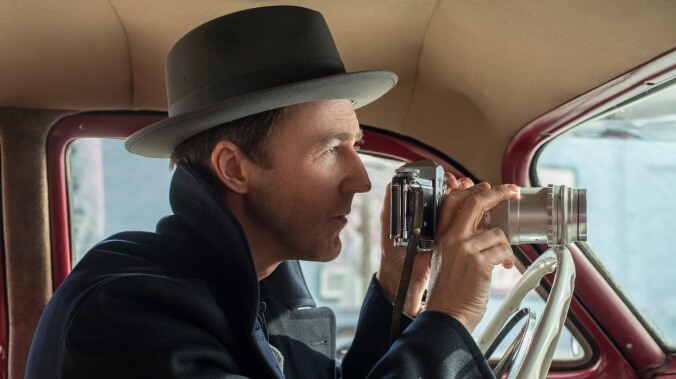Edward Norton returns to directing, and to New York City, with the all-star Motherless Brooklyn


The last time Edward Norton directed a movie, he tweaked his intense actor’s-actor image with Keeping The Faith, a thoughtful and sweetly old-fashioned romantic comedy that radiated love for New York City. Twenty years ago, this was a big studio release—and from Disney, no less. Now, at a time when Keeping The Faith might only exist as a Netflix Original, Norton has finally finished his long-gestating follow-up, an adaptation of Jonathan Lethem’s mystery novel Motherless Brooklyn (a book that was only months old when his last directorial project came out). Though it doesn’t much look or act like his previous movie, Motherless Brooklyn is plenty old-fashioned, too, and it professes its own love (however more complicated) for the actor’s adopted hometown.
This passion project also lets Norton indulge in the kind of tic-heavy acting challenge he embraced early in his career. He casts himself as Lionel Essrog, who works for a ramshackle detective agency (and part-time car service) headed up by Frank Minna (Bruce Willis) in 1950s Brooklyn. Lionel has Tourette’s syndrome, which causes verbal outbursts, as well as some physical tics—if he gets ahold of stray thread on a sweater, for example, he can’t stop pulling on it until someone does him a favor and cuts it off completely. This early moment serves as a clever (if perhaps overly tidy) microcosm of what Frank sees in Lionel: His condition has its presentational challenges, but he’s got a keen, obsessive knack for turning things over in his mind—for pulling on threads until someone stops him.
That job usually falls to Frank, or other co-workers like Gilbert (Ethan Suplee) and Tony (Bobby Cannavale), and when Frank is shot during a mysterious hand-off, the agency is left without a leader. As the others try to pick up the pieces of their flailing business, Lionel literally puts on the old man’s hat and vows to figure out why Frank’s encounter turned violent. His investigation includes posing as a reporter, retracing Frank’s steps to a jazz club in Harlem, and taking some punches in classic noir fashion. Along the way, he crosses paths with community activist Laura Rose (Gugu Mbatha-Raw), a mysterious stranger (Willem Dafoe), and shadowy urban planner Moses Randolph (Alec Baldwin), among others.
It should be noted that Lethem’s novel was not set in the 1950s. Norton has said that he felt shifting the time period was the most expedient way to honor Lethem’s stylized language without making it a major distraction, as it might be in a contemporary-set film. It seems just as likely that Norton the writer-director was excited by the prospect of folding in the period-appropriate big-picture exploits of Moses Randolph, a character who does not appear in the novel and is unmistakably modeled on real-life New York power broker and racist Robert Moses. It’s a storyline that ups Motherless Brooklyn’s ambition along with its running time, as the movie sprawls to 150 minutes with civics-lesson detours about how as long as the Moses name is on enough parks and beaches, his many misdeeds of social engineering will be overlooked.
Moses, outfitted with Baldwin’s velvet growl, makes a solid noir villain. He’s also a foregone conclusion, shady and menacing from his earliest moments, with Baldwin’s face initially obscured for an eventual why-hello-there unveiling. That Baldwin plays a short-tempered powerful man who’s up to no good is just one of several plot turns that are telegraphed from a considerable distance—and, more happily, one of the movie’s many perfect bits of casting. What a balm to see Bruce Willis (however briefly) in a moderate-budget movie with lofty aims, and there are similar pleasures in the rantings of an unkempt Willem Dafoe, the steady gaze of Mbatha-Raw, and the weariness of Leslie Mann in a small but juicy role as Frank’s wife.
The juiciest and most actorly role, of course, belongs to Norton, and there is a bit of performer’s vanity to the way he jumps at the opportunity to showcase Lionel’s various tics. After Primal Fear and The Score (both more potentially self-aware, as acting stunts that are also about acting stunts), Norton playing a guy with Tourette’s syndrome feels almost self-parodic. But he makes such a natural knockabout semi-pro detective that it’s a wonder he hasn’t played one sooner. (He was great at taking hits at least as far back as Fight Club.) Just watching Norton nose around and figure stuff out is a lot of fun, though the movie’s setups are often better than its payoffs.
Handsome and largely unfussy, visually evoking the grayness of late-autumn New York chill, it’s a dad movie for dads who might alternate detective novels with Robert Caro’s The Power Broker. That’s a glib description, but not a pejorative one. Despite the occasional obviousness, there’s resonance in the movie’s portrait of the United States after World War II: a country convinced that its “brute strength,” as one character calls it, could accomplish anything, as the power-hungry steamrolled vulnerable populations while designing its future. Norton’s first film quoted John Updike’s observation about New Yorkers’ “secret belief that people living anywhere else had to be, in some sense, kidding.” Here, he takes a less rosy view, watching as characters see their love for New York turn into a thornier, possibly doomed romance.